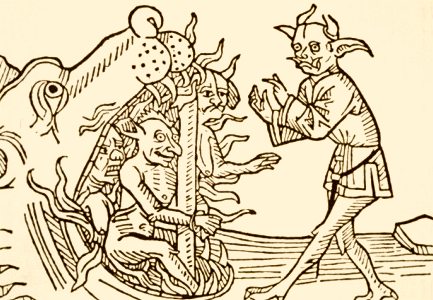
This week’s edition of Dymphna’s Greatest Hits requires a special explanation, because the poem featured below has never previously been published. She wrote it in the summer of 1995 as part of an extended collection that we called Therapy Poems, although its official title eventually became Intense Disclosures (which itself would require a separate essay to explain, but Wallace Stevens aficionados may recognize the reference).
Dymphna liked to say that she had been in therapy longer than Woody Allen. She had seen several therapists before I met her, but after we got together we were quite poor for almost two decades, so her opportunities for professional psychotherapeutic assistance became very infrequent.
In the mid-1990s, however, she was given the opportunity to have weekly sessions with a young psychiatrist who had just entered his residency. She was to be the central case for his thesis, or whatever it is that psychiatric residents do to achieve their final release from training and be allowed to practice. She was able to see him gratis for therapy once a week over a period of a couple of years.
She was, as she herself described it, a Difficult Patient. She knew far too much about psychology, philosophy, theology, and other esoteric subjects to be easy going for a therapist. Fortunately, her doctor was (and is) a competent, kind, considerate, and humane man, and was able to navigate the stormy seas raised by Dymphna’s psychological tempest.
Their sessions were intense, needless to say. Early in their relationship she took to writing a poem after every session, which she would then deliver to him at the start of their next meeting. At the end of his residency, when he had to terminate the therapy, she collected the poems together into a volume entitled Intense Disclosures, had it printed and bound, and gave him a copy.
To create the book, she turned all the original Word documents over to me, and I did all the formatting and indexing necessary for the print version. As a result, I have the full collection — which we always called “Therapy Poems” between ourselves until she picked out an official title — in a form that is easily accessible. “There is a Midnight” (which I posted as part of my eulogy for her), was a member of that collection, as was “Lament For My Brother”, which I posted here.
The poem below may be the best in the collection. She wrote it when she was very unhappy and angry with her therapist (as patients in psychotherapy often are). He was such a WASPy guy, with his blond hair and blue eyes, so she tweaked his nose with “To Young Dr. O’Malley From the Bi-Polar on Ward A-2”.
The poem would still be worth reading if the story ended there. However, after he had read it, he confided to her a personal detail about his life: he had recently learned that his parents had adopted him, and that his biological parents were in fact Jewish. He looked so Aryan, and had been raised a Christian, but genetically speaking, he was a Jew.
Not an old one, though. Not yet.
The poem is below the jump. By the way: “O’Malley” is not his real surname, so there’s no point in searching the lists of accredited Virginia psychiatrists to try and find him.
To Young Dr. O’Malley From the Bi-Polar on Ward A-2
by Dymphna
I don’t need you.
I need an old Jew.
One gone soft in the belly
But still hard in the head…
Who would use “animus”
In conversation, without being Jungian.
Who doesn’t find the spiritual “heavy going”
(Though he might be skeptical).
One on whom the concept of tennis
Would weigh like a stone.I want an old Jew.
Not you.
One with gravy stains on his tie,
Who wears felt slippers to sessions
And sometimes his fly
Flies at half mast
Because, coming back from the bathroom
He detoured to look up a word
And got lost in a thesaurus of associations.I want an old Jew.
Not you.
One who has negotiated
A sturdy peace with the memory
Of his mother. Whose daughter
Writes for money. One from New York,
This Jew, who has got through the wilderness
And come back with a sackful of locusts.
He’s not afraid to share.I want an old Jew.
Not some shiksa’s child
Who hasn’t sustained a fall
He couldn’t get up from;
A therapist without any
Visible means of angst.I want an old Jew.
Not you.
One who knows
That knowing isn’t all
It’s cracked up to be.
One who has turned on
The same spit of suffering,
Over the same coals of envy,
One who could give me the Yiddish
Precisely for this, my very same dilemma.I want an old Jew.
He would understand.

Wow! This is a great poem! Thank you so much for sharing.
Second your sentiment.
Can definitely feel a subtle whiff of the psyche ward about it (not uncommon for poets), but some metaphors are deep and thought provoking.
Mazeltov, Dymphna!
That’s perfect, jlh; this gentile has nothing to add, except to thank the Baron for sharing.
Fascinating.